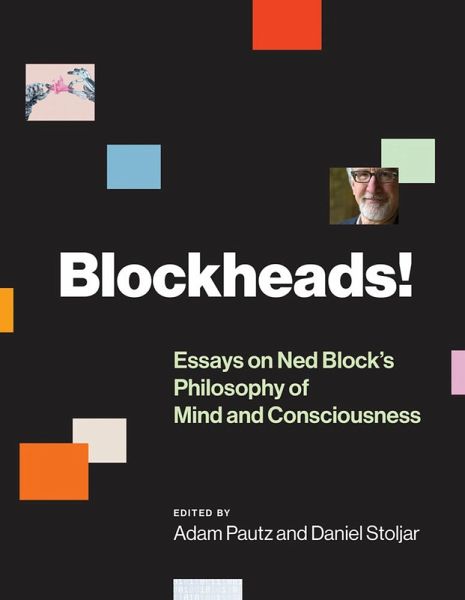
Blockheads! (eBook, ePUB)
Essays on Ned Block's Philosophy of Mind and Consciousness
Redaktion: Pautz, Adam; Stoljar, Daniel
Versandkostenfrei!
Sofort per Download lieferbar
50,95 €
inkl. MwSt.
Weitere Ausgaben:

PAYBACK Punkte
25 °P sammeln!
New essays on the philosophy of Ned Block, with substantive and wide-ranging responses by Block.Perhaps more than any other philosopher of mind, Ned Block synthesizes philosophical and scientific approaches to the mind; he is unique in moving back and forth across this divide, doing so with creativity and intensity. Over the course of his career, Block has made groundbreaking contributions to our understanding of intelligence, representation, and consciousness. Blockheads! (the title refers to Block's imaginary counterexample to the Turing testand to the Block-enthusiast contributors) offers e...
New essays on the philosophy of Ned Block, with substantive and wide-ranging responses by Block.
Perhaps more than any other philosopher of mind, Ned Block synthesizes philosophical and scientific approaches to the mind; he is unique in moving back and forth across this divide, doing so with creativity and intensity. Over the course of his career, Block has made groundbreaking contributions to our understanding of intelligence, representation, and consciousness. Blockheads! (the title refers to Block's imaginary counterexample to the Turing testand to the Block-enthusiast contributors) offers eighteen new essays on Block's work along with substantive and wide-ranging replies by Block. The essays and responses not only address Block's past contributions but are rich with new ideas and argument. They importantly clarify many key elements of Block's work, including his pessimism concerning such thought experiments as Commander Data and the Nation of China; his more general pessimism about intuitions and introspection in the philosophy of mind; the empirical case for an antifunctionalist, biological theory of phenomenal consciousness; the fading qualia problem for a biological theory; the link between phenomenal consciousness and representation (especially spatial representation); and the reducibility of phenomenal representation. Many of the contributors to Blockheads! are prominent philosophers themselves, including Tyler Burge, David Chalmers, Frank Jackson, and Hilary Putnam.
Contributors Ned Block, Bill Brewer, Richard Brown, Tyler Burge, Marisa Carrasco, David Chalmers, Frank Jackson, Hakwan Lau, Geoffrey Lee, Janet Levin, Joseph Levine, William G. Lycan, Brian P. McLaughlin, Adam Pautz, Hilary Putnam, Sydney Shoemaker, Susanna Siegel, Nicholas Silins, Daniel Stoljar, Michael Tye, Sebastian Watzl
Perhaps more than any other philosopher of mind, Ned Block synthesizes philosophical and scientific approaches to the mind; he is unique in moving back and forth across this divide, doing so with creativity and intensity. Over the course of his career, Block has made groundbreaking contributions to our understanding of intelligence, representation, and consciousness. Blockheads! (the title refers to Block's imaginary counterexample to the Turing testand to the Block-enthusiast contributors) offers eighteen new essays on Block's work along with substantive and wide-ranging replies by Block. The essays and responses not only address Block's past contributions but are rich with new ideas and argument. They importantly clarify many key elements of Block's work, including his pessimism concerning such thought experiments as Commander Data and the Nation of China; his more general pessimism about intuitions and introspection in the philosophy of mind; the empirical case for an antifunctionalist, biological theory of phenomenal consciousness; the fading qualia problem for a biological theory; the link between phenomenal consciousness and representation (especially spatial representation); and the reducibility of phenomenal representation. Many of the contributors to Blockheads! are prominent philosophers themselves, including Tyler Burge, David Chalmers, Frank Jackson, and Hilary Putnam.
Contributors Ned Block, Bill Brewer, Richard Brown, Tyler Burge, Marisa Carrasco, David Chalmers, Frank Jackson, Hakwan Lau, Geoffrey Lee, Janet Levin, Joseph Levine, William G. Lycan, Brian P. McLaughlin, Adam Pautz, Hilary Putnam, Sydney Shoemaker, Susanna Siegel, Nicholas Silins, Daniel Stoljar, Michael Tye, Sebastian Watzl
Dieser Download kann aus rechtlichen Gründen nur mit Rechnungsadresse in A, B, BG, CY, CZ, D, DK, EW, E, FIN, F, GR, HR, H, IRL, I, LT, L, LR, M, NL, PL, P, R, S, SLO, SK ausgeliefert werden.













